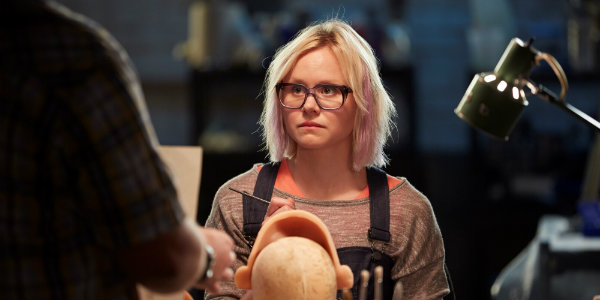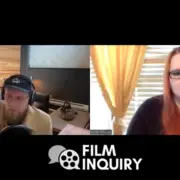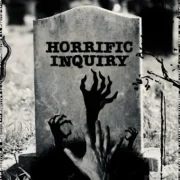ZOOM: A Fractured Comedy On Self-Identity

English Major, Film Buff, and Citizen of the World, Sean…
From up-and-coming director Pedro Morelli and first-time screenwriter Matt Hansen, Zoom is a fascinating fantasy drama about artistic identity. Tracking the lives of three central protagonists, Morelli miraculously creates a strange, circuitous world wherein everything is connected. Despite seemingly existing within the confines of each other’s imaginative works of fiction, comic book artist Emma Boyle (Alison Pill), movie director Edward Deacon (Gael García Bernal), and aspiring novelist Michelle (Mariana Ximenes) soon bleed into each other’s codependent realities.
The means by which this feat is achieved is part movie magic and part and imaginative science-fiction. A self-professed admirer of the work of Charlie Kaufman, Morelli‘s film works on some of the same levels of subjective realism and solipsistic daydream. Like Adaptation or Synecdoche, New York, Zoom artfully depicts the interiority of the artistic mind in pursuit of an individually imagined human ideal.
But as Emma, Edward, and Michelle all learn by the film’s end, there is no such thing as perfection, as humans are infallible in their inherent imperfection. Seen striving towards various romantic ideals of self, perpetuated by such socially propagated traps as body image and sexual anxiety, Morelli‘s characters set about recasting their own lives against that of one another’s throughout what proves to be a complicated and convoluted comedy.
A Sense of Self
At the beginning of Zoom, comic book artist Emma Boyle (Pill) is introduced within the stifling environs of her day job as a sex doll manufacturer. Complimented by her earnest, albeit doughy and sophomoric, boyfriend Bob (Tyler Labine), Emma’s life is one of compromised artistic ambition and personal fulfillment. Her sense of self is accordingly fractured, as her own modest bust becomes the source of some anxiety after being surrounded by dolls whose own balloon-sized breasts make her feel less desirable.

So begins Emma’s story, one that examines objective beauty against subjective self-worth, as illustrated via several layers of artistic reinvention. After being frustrated by her own apparent beauty as seen by other people, Emma vents all of her anguish into her creation of Edward Deacon (Bernal), an adonis film director made in her own image of what she imagines to be the perfect man. But little does Emma know that within the panels of her latest graphic novel lies another layer of her fabricated self.
Enter Michelle (Ximenes), who simultaneously serves as the subject of Edward’s directorial vision and the architect of Emma’s own neurosis. Living the life of a model who wishes to shirk the outward trappings of beauty for the inner resonance of a life of the mind, Michelle’s furiously scribbled first novel begins to dictate Emma’s own sense of self. But as all three characters begin to question and doubt how they see and feel about themselves, their self-inflicted distortions of personal identity begin to shape and inform one another’s separate realities.
Comedy ad Absurdum
Keeping Morelli‘s aesthetic and narrative debts to the works of Charlie Kaufman in mind, Zoom might be seen as something of an offshoot from the latter filmmaker’s indelible impression on the landscape of independent filmmaking. Morelli obviously loves the ways in which Kaufman is able to examine artistic identity and self-consciousness through various meta-fictional conceits. Borrowing heavily from such a postmodern filmmaking standard, Zoom flirts with a lot of Kaufman-like feats of cinematic surrealism and existential ambiguity.

But the movie that Zoom more closely resembles is the at times under-appreciated 2006 fantasy-drama Stranger Than Fiction. Directed by critically acclaimed filmmaker Marc Forster, Stranger Than Fiction stars Will Ferrell as white-collar nobody Harold Crick, who begins hearing the disembodied voice of renowned novelist Karen Eiffel (Emma Thompson) in his head. Karen then takes it upon herself to begin to write Harold’s life story, much to Harold’s predictable chagrin and disorientation.
The ways in which Forster finds comedy in meta-fictional elements of Stranger Than Fiction mirror Morelli‘s own bursts of humanitarian warmth in Zoom. Possessing far more pathos than Charlie Kaufman is typically capable of bearing, Zoom is an immediately funnier movie than Adaptation or Synecdoche, New York. While lead actors Nicolas Cage and Philip Seymour Hoffman face similar plights of personal disorientation in Kaufman‘s hands, Morelli offers Emma, Edward, and Michelle a lot more room to laugh at themselves then Kaufman ever deigns to offer any of his respective protagonists.
Human Imperfection
After treating viewers with a winding and circuitous fantasy across three seemingly separate narrative landscapes, Zoom finally reaches a climactic third act that serves to bring all three individual artists together. When the worlds of Emma (Pill), Edward (Bernal), and Michelle (Ximenes) finally collide, and each depiction of their respectively idealized selves is forced to look at one another, Morelli finally grants the viewer cataclysmic absolution.

Plunging to her apparent death in the world of Edward’s film, Michelle manages to write the words “Wake Up” to serve as the ending to her novel, as well as the film’s two parallel worlds. Zoom thus closes in a state of apparent indecision in keeping with much of the narrative’s incessant grapplings with self-identity dictated by social revisionism and personal insecurity. Emma, Edward, and Michelle can’t quite seem to reach an absolute conception of self on their own independent volitions, though in one final collaborative effort briefly intimated the three fractured selves might yet finally merge into one entirely realized idea of human imperfection.
Morelli offers a wondrously incomplete final draft of the ideal human form through three complicated artistic endeavors. Human perfectionism is made imperfect in practice throughout Zoom, thanks in no small part to Morelli‘s indelible comedic taste and compassion for his tumultuously conflicted protagonists. Charlie Kaufman might be the most obvious influence upon Matt Hansen‘s original screenplay, but Morelli ultimately proves to be far more optimistic in terms of tone.
Conclusion
Even when Zoom falls a little short in terms of offering a conclusive ending to its overly complicated and interconnected narrative threads, Morelli and Hansen offer a filmed comedy about artistic representations of self-identity that offers emotional catharsis for its characters and viewers.
There is no easy answer to how one goes about achieving satisfaction with one’s self and work in Morelli‘s film, but there is thankfully no shortage of uproariously heartfelt moments of acceptance in the face of human imperfection.
Are you a fan of Charlie Kaufman? If so, what did you think of Zoom?
Zoom is now playing in theaters in select theaters in the U.S. Find international release dates here.
https://www.youtube.com/watch?v=M80fAF0IU3o
Does content like this matter to you?
Become a Member and support film journalism. Unlock access to all of Film Inquiry`s great articles. Join a community of like-minded readers who are passionate about cinema - get access to our private members Network, give back to independent filmmakers, and more.
English Major, Film Buff, and Citizen of the World, Sean K. Cureton is a born and raised Jersey Boy. Having received a B.A. in English from Rutgers University, Sean is proud to call the Garden State his home, equidistant from both the steps that made Sylvester Stallone a household name, and the park where Harry was cordially introduced to Sally, even if he’d prefer to a stay in state due to a certain fondness for a convenience store located in Leonardo, NJ. When he’s not in the multiplex, you can follow him on Twitter, @seankcureton.













